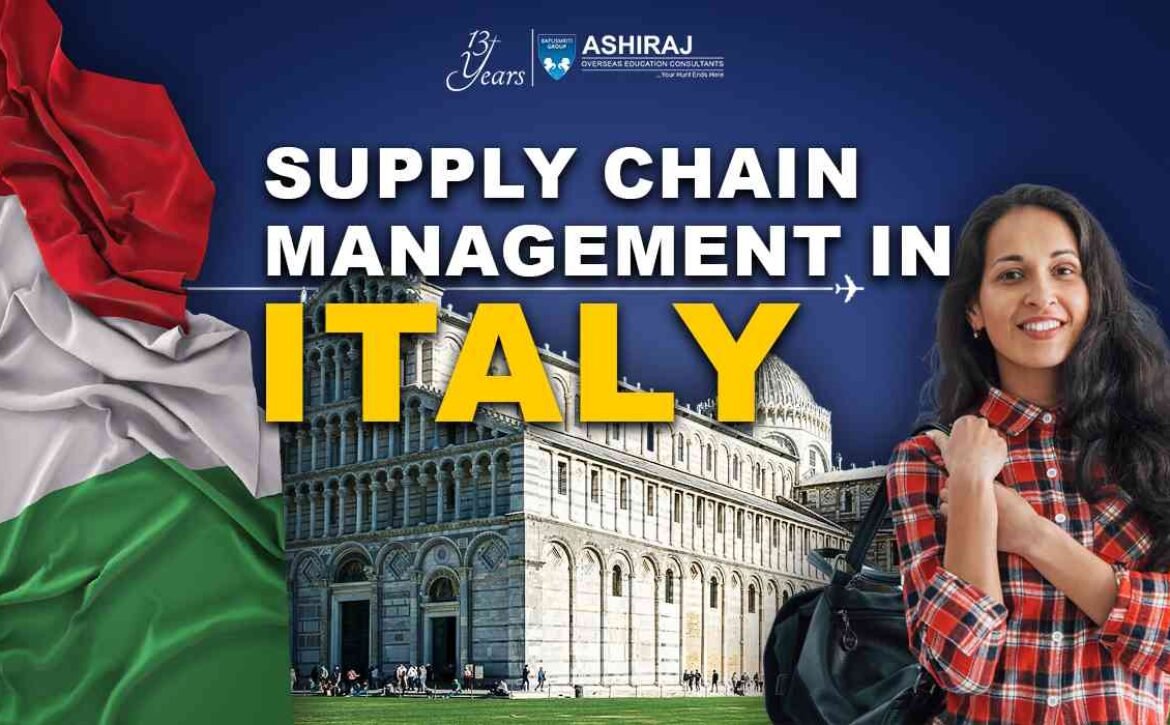
Supply Chain Management in Italy
Supply chain management in Italy plays a pivotal role in the country’s robust industrial landscape. With Italy being renowned for its craftsmanship and quality, efficient supply chain management is imperative to maintain competitiveness in both domestic and international markets. From fashion to automotive, Italy’s supply chain intricacies navigate a diverse array of industries, each with its unique demands and challenges. The Italian supply chain ecosystem thrives on innovation and adaptability, leveraging technology to optimize processes and ensure seamless operations from production to distribution.
In recent years, supply chain management in Italy has undergone significant transformations, driven by factors such as globalization, digitalization, and sustainability. Embracing technological advancements, Italian businesses are integrating advanced analytics, artificial intelligence, and blockchain to enhance supply chain visibility, traceability, and efficiency. Moreover, with an increasing emphasis on sustainability, Italy’s supply chain management is evolving towards eco-friendly practices, reducing carbon footprints and promoting ethical sourcing. As Italy continues to navigate evolving market dynamics, effective supply chain management remains integral to sustaining its position as a global economic powerhouse.
Why to Study Supply Chain Management in Italy?
- Rich Industrial Heritage: Italy boasts a rich industrial heritage, particularly in sectors like fashion, automotive, and manufacturing, providing ample opportunities for hands-on learning and industry exposure.
- Global Reputation: With a reputation for craftsmanship and quality, studying supply chain management in Italy offers insights into managing complex supply networks in global markets.
- Innovation Hub: Italy serves as an innovation hub, embracing cutting-edge technologies like AI, blockchain, and IoT in supply chain operations, providing valuable insights into modern practices.
- Strategic Location: Situated at the crossroads of Europe, Italy offers strategic access to key markets, facilitating understanding of international trade dynamics and logistics management.
- Networking Opportunities: Studying supply chain management in Italy provides access to a diverse network of industry professionals, fostering valuable connections and potential career opportunities.
- Sustainability Focus: With a growing emphasis on sustainability, Italian supply chain programs incorporate eco-friendly practices, preparing students for the evolving demands of responsible business operations.
By studying supply chain management in Italy, students gain a comprehensive understanding of global supply chain dynamics while immersing themselves in a vibrant cultural and industrial landscape.
Top Universities to Study Supply Chain Management in Italy
University | QS World University Ranking 2023 | Type of University | Average Annual Fees | Programs Offered |
Bocconi University | 1 | Private | €15,000 – €20,000 | – Master of Science in Supply Chain Management |
Politecnico di Milano | 2 | Public | €3,000 – €5,000 | – Master in Management Engineering |
University of Bologna | 3 | Public | €2,000 – €4,000 | – Master in Logistics and Supply Chain Management |
Sapienza University of Rome | 4 | Public | €1,500 – €3,000 | – Master in Global Supply Chain Management |
University of Padua | 5 | Public | €2,500 – €4,000 | – Master in Supply Chain Management |
- Bocconi University: Renowned for its prestigious programs, Bocconi offers a Master of Science in Supply Chain Management, preparing students for leadership roles in global supply chain operations.
- Politecnico di Milano: Specializing in engineering and technology, Politecnico’s Master in Management Engineering provides a multidisciplinary approach to supply chain management, integrating technical and managerial skills.
- University of Bologna: With a long history of academic excellence, the University of Bologna offers a comprehensive Master in Logistics and Supply Chain Management, emphasizing strategic planning and optimization.
- Sapienza University of Rome: Sapienza’s Master in Global Supply Chain Management focuses on international trade and logistics, equipping students with the skills to navigate complex global supply networks.
- University of Padua: Known for its research-oriented programs, the University of Padua offers a Master in Supply Chain Management, emphasizing innovative solutions and sustainability in supply chain practices.
Course Curriculum for Supply Chain Management in Italy
- Core Concepts: Supply chain management programs in Italy cover fundamental concepts such as logistics, procurement, inventory management, and distribution strategies to provide a comprehensive understanding of supply chain operations.
- Technology Integration: With Italy’s focus on innovation, courses often integrate cutting-edge technologies like AI, blockchain, and data analytics to optimize supply chain processes and enhance efficiency.
- Global Perspective: Given Italy’s prominence in international trade, the curriculum emphasizes global supply chain dynamics, including cross-border logistics, trade regulations, and cultural considerations.
- Sustainability Practices: Recognizing the importance of sustainability, Italian supply chain programs incorporate modules on eco-friendly practices, ethical sourcing, and green logistics to address contemporary environmental challenges.
- Industry Collaboration: Many programs offer opportunities for industry collaboration through internships, case studies, and guest lectures, enabling students to gain practical insights and network with professionals in the field.
- Soft Skills Development: In addition to technical knowledge, courses focus on developing soft skills such as communication, problem-solving, and leadership abilities essential for effective supply chain management roles.
By providing a blend of theoretical knowledge and practical skills, supply chain management courses in Italy prepare students to excel in dynamic and competitive global business environments.
Eligibility Criteria & Admission Requirements for MS in Supply Chain Management in Italy
- Language Proficiency: Applicants must demonstrate proficiency in English through standardized tests such as IELTS or TOEFL. Minimum scores typically range from 6.5 to 7.0 for IELTS and 80 to 100 for TOEFL.
- Standardized Test Scores: Most universities require applicants to submit scores for either GRE or GMAT. The minimum score varies among institutions but generally falls within the range of 300 to 320 for GRE and 600 to 700 for GMAT.
- Educational Background: Candidates should hold a bachelor’s degree from a recognized institution, preferably in business, engineering, or related fields. Some programs may have specific GPA requirements.
- Passport & Student Visa: International students need a valid passport and a student visa to study in Italy. Visa application processes and requirements may vary depending on the applicant’s nationality.
- Academic Certificates: Applicants must provide transcripts and certificates of their academic qualifications, including their bachelor’s degree and any relevant certifications or diplomas.
- Work Experience: While not always mandatory, some universities may prefer candidates with relevant work experience in supply chain management or related fields. Work experience can enhance an applicant’s profile and contribute to the learning experience.
Table: Standardized Test Scores
Test | Minimum Score |
IELTS | 6.5 – 7.0 |
TOEFL | 80 – 100 |
GRE | 300 – 320 |
GMAT | 600 – 700 |
Meeting these eligibility criteria ensures that applicants are well-prepared to pursue a master’s degree in Supply Chain Management in Italy, facilitating their academic and professional growth in this dynamic field.
Documents Required for Studying Supply Chain Management in Italy
- Passport: A valid passport is essential for international students applying to study Supply Chain Management in Italy. Ensure it has sufficient validity beyond the duration of your intended stay.
- Letters of Recommendation (LOR): Typically, two LORs from academic or professional referees are required. These letters should attest to your academic abilities, character, and suitability for the program.
- Statement of Purpose (SOP): An SOP outlining your academic background, career goals, and reasons for choosing Supply Chain Management in Italy is crucial. It helps admission committees understand your motivations and aspirations.
- Curriculum Vitae (CV): A comprehensive CV detailing your educational qualifications, work experience, extracurricular activities, and any relevant achievements is necessary.
- Official High School Transcripts: Transcripts from your high school or equivalent institution demonstrating your academic performance are required for admission consideration.
- Supply Chain Management Certificates: If applicable, include certificates or diplomas related to Supply Chain Management courses or workshops you have completed to showcase your relevant skills and knowledge.
- Work Experience Certificate: If you have work experience in the field, provide a certificate from your employer detailing your job role, responsibilities, and duration of employment.
- Proof of Financial Resources: Demonstrating sufficient financial resources to cover tuition fees, living expenses, and other related costs is essential for obtaining a student visa. This may include bank statements, scholarship awards, or sponsorship letters.
Gathering these documents ensures a smooth application process for studying Supply Chain Management in Italy, setting the foundation for a successful academic journey.
Admission Process for Supply Chain Management in Italy
- Research Universities: Begin by researching universities in Italy offering Supply Chain Management programs. Consider factors such as reputation, curriculum, faculty, and location.
- Check Eligibility Criteria: Review the eligibility criteria for each university, including academic requirements, language proficiency tests (IELTS/TOEFL), and standardized test scores (GRE/GMAT).
- Prepare Documents: Gather required documents, including passport, transcripts, letters of recommendation (LOR), statement of purpose (SOP), curriculum vitae (CV), and proof of financial resources.
- Submit Application: Complete the online application form for your chosen universities, ensuring all details are accurate and all required documents are attached.
- Language Proficiency Test: Schedule and take the required English language proficiency test (IELTS/TOEFL) and submit the scores to the universities.
- Standardized Tests: If necessary, register for and take the GRE or GMAT exam. Submit your scores to the universities as per their requirements.
- Wait for Admission Decision: After submitting your application, wait for the university’s admission decision. This may take several weeks or months depending on the university’s timeline.
- Acceptance and Visa Process: Upon receiving an acceptance letter, proceed with the visa application process. Prepare necessary documents and attend any interviews required for the student visa.
- Enrollment and Orientation: Once your visa is approved, complete the enrollment process as instructed by the university. Attend orientation sessions to familiarize yourself with the campus and academic requirements.
Following these steps ensures a smooth admission process for studying Supply Chain Management in Italy, setting the stage for a rewarding academic experience.
“Education is the most powerful weapon which you can use to change the world.”
Nelson Mandela
Cost of Supply Chain Management Course in Italy
- Tuition Fees: The cost of tuition for Supply Chain Management programs in Italy varies depending on the university and program duration. On average, annual tuition fees range from €3,000 to €20,000.
- Living Expenses: Living expenses including accommodation, food, transportation, and other miscellaneous costs differ based on the city and lifestyle. On average, students should budget around €8,000 to €12,000 per year.
- Books and Supplies: Expenses for textbooks, study materials, and other academic supplies should also be considered. Budget approximately €500 to €1,000 per year for these items.
- Health Insurance: International students are required to have health insurance coverage during their stay in Italy. The cost varies but typically ranges from €150 to €300 per year.
- Travel and Miscellaneous: Additional expenses such as travel, leisure activities, and unforeseen circumstances should be factored into the overall budget. Allocate around €1,000 to €2,000 per year for these expenses.
- Scholarships and Financial Aid: Explore scholarships, grants, and financial aid options offered by universities, government agencies, and private organizations to offset some of the expenses associated with studying Supply Chain Management in Italy.
Understanding the cost of studying Supply Chain Management in Italy helps prospective students plan their finances accordingly and make informed decisions about their education.
Scholarships for Supply Chain Management Courses in Italy
Scholarship Name | Amount | Application Deadline |
Italian Government Scholarships | Full tuition fees + Monthly stipend | Varies (typically between January and April) |
University-specific Scholarships | Varies | Varies |
Erasmus+ Scholarships | Varies | Varies |
Fulbright Scholarships | Varies | Varies |
Santander Scholarships | €5,000 – €10,000 | Varies |
- Italian Government Scholarships: Offered by the Italian government, these scholarships cover full tuition fees and provide a monthly stipend to selected international students. Application deadlines vary but typically fall between January and April.
- University-specific Scholarships: Many universities in Italy offer their own scholarships for international students pursuing Supply Chain Management programs. The amount and deadlines vary depending on the institution.
- Erasmus+ Scholarships: Erasmus+ offers scholarships and grants for students from EU and partner countries to study abroad. The amount and deadlines vary based on the specific program and country of origin.
- Fulbright Scholarships: Fulbright scholarships support international students, scholars, and professionals in various fields, including Supply Chain Management. Deadlines and award amounts vary.
- Santander Scholarships: Santander Bank offers scholarships ranging from €5,000 to €10,000 to international students studying in Italy. Application deadlines and eligibility criteria are determined by the bank.
Exploring these scholarship opportunities can significantly alleviate the financial burden of studying Supply Chain Management in Italy, making education more accessible to deserving candidates.
Career Opportunities After Supply Chain Management in Italy
Job Profile | Average Salary (EUR) |
Supply Chain Analyst | €35,000 – €45,000 |
Logistics Coordinator | €30,000 – €40,000 |
Procurement Manager | €40,000 – €50,000 |
Operations Manager | €45,000 – €55,000 |
Supply Chain Consultant | €50,000 – €60,000 |
- Supply Chain Analyst: Analyzes supply chain data to optimize processes and improve efficiency. Average salary ranges from €35,000 to €45,000 per year.
- Logistics Coordinator: Coordinates transportation, warehousing, and distribution activities. Average salary is between €30,000 and €40,000 annually.
- Procurement Manager: Manages procurement processes, negotiates contracts, and ensures cost-effectiveness. Salary typically ranges from €40,000 to €50,000 per year.
- Operations Manager: Oversees overall supply chain operations, including production, inventory, and logistics. Earns an average salary of €45,000 to €55,000 annually.
- Supply Chain Consultant: Provides strategic advice to optimize supply chain performance for businesses. Salary can range from €50,000 to €60,000 per year.
Supply Chain Management in Italy offers diverse career opportunities across various sectors, with competitive salaries and prospects for advancement. Graduates can pursue roles in analysis, coordination, management, and consultancy, contributing to the efficient flow of goods and services in both domestic and international markets.
Frequently Asked Questions About Supply Chain Management in Italy
Supply Chain Management in Italy offers diverse job prospects across industries such as manufacturing, fashion, automotive, and retail. Graduates can pursue roles as supply chain analysts, logistics coordinators, procurement managers, operations managers, and supply chain consultants.
Yes, there are scholarships available for studying Supply Chain Management in Italy. These scholarships include Italian government scholarships, university-specific scholarships, Erasmus+ scholarships, Fulbright scholarships, and Santander scholarships, among others.
The eligibility criteria typically include holding a bachelor’s degree, demonstrating proficiency in English through tests like IELTS or TOEFL, submitting GRE or GMAT scores, providing academic transcripts, and fulfilling visa requirements for international students.
The average cost of studying Supply Chain Management in Italy includes tuition fees, living expenses, books and supplies, health insurance, and miscellaneous expenses. On average, students can expect to spend between €10,000 to €25,000 per year.
The duration of a Master’s in Supply Chain Management in Italy typically ranges from one to two years, depending on the program structure and whether it includes internships or thesis projects.
Most universities in Italy require international students to demonstrate proficiency in English through standardized tests such as IELTS or TOEFL. Some programs may also offer courses in Italian, so proficiency in Italian can be beneficial.
Yes, international students in Italy are allowed to work part-time while studying. However, there are restrictions on the number of hours they can work per week, typically up to 20 hours during the academic year and full-time during holidays.
The application process typically involves researching universities, checking eligibility criteria, preparing required documents, submitting applications online, taking standardized tests, waiting for admission decisions, and completing enrollment and visa processes.
Some of the top universities in Italy for Supply Chain Management include Bocconi University, Politecnico di Milano, University of Bologna, Sapienza University of Rome, and University of Padua, among others.
After completing a Master’s in Supply Chain Management in Italy, graduates can pursue various career opportunities such as supply chain analysts, logistics coordinators, procurement managers, operations managers, supply chain consultants, and more.






